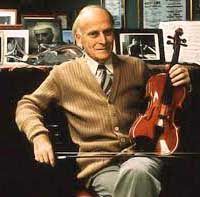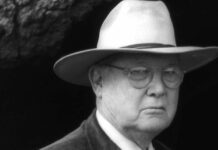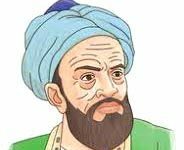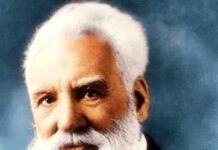“Explore the life and legacy of Yehudi Menuhin, one of the 20th century’s greatest violinists, known for his extraordinary talent, humanitarian efforts, and contributions to global music culture.”
Yehudi Menuhin-Brief Life Sketch
Yehudi Menuhin was a great violinist of the twentieth century. He was born on April 22, 1916, in New York, USA. At the age of seven, he surprised the audience by playing the violin on a solo show in San Francisco, USA and was able to achieve worldwide fame. That program established Menuhin as a wonder boy. Scientist Albert Einstein, listening to his violin, commented ‘Now I have believed that truly there is God in Heaven.’
After completing his education, Menuhin devoted himself deeply to the development and transcendence of the violin style. For this, he had to travel to many countries in the world. After World War II, he moved to England and Switzerland. In 1962, he set up a music school near London to educate music-loving children, and in parallel, continued his efforts for the development of the violin and various aspects of music. In recognition of his outstanding contribution to the music industry, Menuhin received the honorary title of ‘Knight’ in 1965. In 1968, he was awarded the Jawaharlal Nehru Award from India. Menuhin, who became a British citizen in 1985, became a member of the Order of Merit in 1978. Yehudi Menuhin died in Berlin on March 12, 1999.
Yehudi Menuhin-Comprehensive Biography
Yehudi Menuhin (1916–1999) was one of the most celebrated violinists of the 20th century, known for his extraordinary talent, profound musicality, and humanitarian efforts. His career spanned over seven decades, during which he became a symbol of artistic excellence and cultural diplomacy. Menuhin’s life and work not only left an indelible mark on classical music but also contributed significantly to promoting peace and understanding through music.
Early Life and Musical Beginnings
Yehudi Menuhin was born on April 22, 1916, in New York City to Jewish parents of Russian descent. His father, Moshe Menuhin, was a writer and teacher, while his mother, Marutha Sher, was a dedicated and ambitious figure who played a significant role in managing his early career. Yehudi’s prodigious talent was apparent from an early age. He began studying the violin at the age of four under Sigmund Anker and later with the renowned violin teacher Louis Persinger.
Menuhin’s extraordinary abilities were quickly recognized, and by the age of seven, he made his debut with the San Francisco Symphony Orchestra. At the age of ten, he performed at Carnegie Hall, establishing himself as a child prodigy. His early teachers included the great Romanian violinist George Enescu, who profoundly influenced his artistic development.
Rise to International Stardom
By his teenage years, Menuhin had already become an international sensation. His performances were lauded for their technical brilliance, emotional depth, and interpretative insight. In 1932, at the age of 16, he recorded the Beethoven and Brahms violin concertos with the Berlin Philharmonic under Bruno Walter, an achievement that cemented his reputation as one of the greatest violinists of his time.
Throughout the 1930s, Menuhin continued to perform around the world, earning praise from audiences and critics alike. His interpretations of works by composers such as Johann Sebastian Bach, Ludwig van Beethoven, Johannes Brahms, and Pyotr Ilyich Tchaikovsky became definitive, influencing generations of violinists.
World War II and Humanitarian Work
During World War II, Menuhin performed extensively for Allied troops, bringing music to soldiers on the front lines and in hospitals. These performances were not only acts of artistic expression but also of humanitarian service, as Menuhin sought to bring comfort and hope through his music.
After the war, Menuhin’s commitment to humanitarian causes deepened. He became an advocate for human rights and a vocal opponent of anti-Semitism and other forms of discrimination. In the post-war years, Menuhin performed in Germany as a gesture of reconciliation, notably playing with the Berlin Philharmonic under the direction of Wilhelm Furtwängler, a controversial figure due to his association with the Nazi regime. Menuhin’s decision was driven by his belief in the power of music to heal and unite.
Later Career and Expanding Interests
In the 1950s and 1960s, Menuhin’s career continued to flourish, but he also expanded his interests beyond the violin. He became a respected conductor, leading many of the world’s leading orchestras. In 1958, he founded the Bath Festival, which he directed for a decade, and in 1963, he established the Yehudi Menuhin School in Surrey, England, a specialist music school for talented young musicians. This institution became one of his most enduring legacies, nurturing future generations of musicians.
Menuhin also explored music from different cultures, collaborating with artists from diverse traditions. One of his most famous collaborations was with the Indian sitar virtuoso Ravi Shankar. Their groundbreaking East-West fusion albums, such as *West Meets East* (1967), were pioneering in introducing Western audiences to Indian classical music and fostering cross-cultural understanding.
Honors and Legacy
Throughout his life, Menuhin received numerous awards and honors for his contributions to music and humanity. He was knighted by Queen Elizabeth II in 1965, becoming Sir Yehudi Menuhin, and in 1985, he was created a life peer as Baron Menuhin of Stoke d’Abernon. He also received the prestigious Wolf Prize in Arts in 1991.
Menuhin’s legacy extends beyond his extraordinary musicianship. He was deeply committed to the idea that music could be a force for good in the world. His work as a conductor, educator, and cultural ambassador reflected his belief that music could transcend political and cultural boundaries, bringing people together in a shared experience of beauty and understanding.
Personal Life
Menuhin married twice. His first marriage was to Nola Nicholas, the daughter of an Australian industrialist, in 1938. They had two children, but the marriage ended in divorce in 1947. Later that year, he married the actress Diana Gould, with whom he had two more children. Diana remained his partner and collaborator until his death.
Final Years and Death
In his later years, Menuhin continued to perform, conduct, and teach, remaining active in the music world well into his 80s. He also authored several books, including an autobiography, “Unfinished Journey” (1977), in which he reflected on his life, career, and the evolving role of music in society.
Yehudi Menuhin passed away on March 12, 1999, in Berlin, Germany, at the age of 82. His death marked the end of an era in classical music, but his influence endures through his recordings, writings, and the many musicians and audiences he inspired.
Conclusion
Yehudi Menuhin was a towering figure in the world of classical music, whose artistry and humanity left an indelible mark on the 20th century. His legacy as a violinist, conductor, educator, and humanitarian continues to inspire new generations of musicians and reminds us of the profound power of music to connect and uplift the human spirit.
Yehudi Menuhin-Facts
Main Facts About Yehudi Menuhin:
- Full Name: Yehudi Menuhin.
- Birth: April 22, 1916, in New York City, USA.
- Early Talent: Recognized as a child prodigy, debuted with the San Francisco Symphony at age seven.
- Famous Recordings: Recorded Beethoven and Brahms violin concertos with the Berlin Philharmonic at age 16.
- World War II: Performed for Allied troops, promoting hope and peace through music.
- Humanitarian Work: Advocated for human rights and reconciliation, performed in post-war Germany.
- Later Career: Founded the Yehudi Menuhin School and collaborated with artists like Ravi Shankar on cross-cultural music projects.
- Honors: Knighted in 1965 and made a life peer as Baron Menuhin in 1985.
- Death: Passed away on March 12, 1999, in Berlin, Germany. 0 0 0
N.B. The article ‘Yehudi Menuhin-Brief Life Sketch’ originally belongs to the book ‘Introduction to World Personalities‘ by Menonim Menonimus.
Books of Composition by M. Menonimus:
- Advertisement Writing
- Amplification Writing
- Note Making
- Paragraph Writing
- Notice Writing
- Passage Comprehension
- The Art of Poster Writing
- The Art of Letter Writing
- Report Writing
- Story Writing
- Substance Writing
- School Essays Part-I
- School Essays Part-II
- School English Grammar Part-I
- School English Grammar Part-II..
Books of S. Story by M. Menonimus:
Books of Biography by M. Menonimus:
- The World Writers-Brief Biographies
- Introduction to World Writers
- Introduction to World Personalities
- Love of Reputed Persons ..
Related Search:
- Lives of Poets
- Writers’ Lives
- Top Hundred Writers
- Best Writers of All Time
- Most Eminent English Poets











